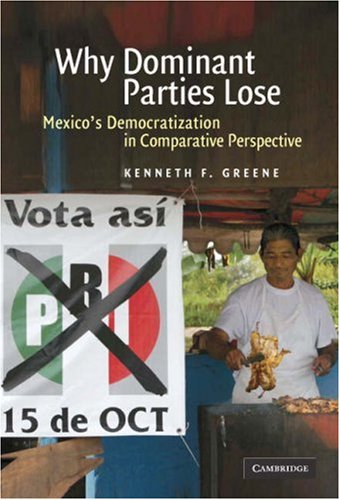(Ebook) Why Dominant Parties Lose: Mexico's Democratization in Comparative Perspective by Kenneth F. Greene ISBN 9780511335532, 9780521877190, 0521877199, 0511335539
Why have dominant parties persisted in power for decades in countries spread across the globe? Why did most eventually lose? Why Dominant Parties Lose develops a theory of single-party dominance, its durability, and its breakdown into fully competitive democracy. Greene shows that dominant parties turn public resources into patronage goods to bias electoral competition in their favor and virtually win elections before election day without resorting to electoral fraud or bone-crushing repression. Opposition parties fail not because of limited voter demand or institutional constraints but because their resource disadvantages force them to form as niche parties with appeals that are out of step with the average voter. When the political economy of dominance-- a large state and a politically quiescent public bureaucracy-erodes, the partisan playing field becomes fairer and opposition parties can expand into catchall competitors that threaten the dominant party at the polls. Greene uses this argument to show why Mexico transformed from a dominant party authoritarian regime under PRI rule to a fully competitive democracy. He also shows that this argument can account for single-party dominance in other countries where the surrounding regime is authoritarian (Malaysia and Taiwan) and where it is democratic (Japan and Italy). The findings have implications for Mexico's political future, the formation of new political parties, transitions to democracy, and the study of competitive authoritarianism. Kenneth F. Greene is Assistant Professor of Government at the University of Texas at Austin. His research on regimes, political parties, and voting behavior has been published in the American Journal of Political Science, Comparative Political Studies, PS: Political Science and Politics, Política y Gobierno, Foreign Affairs en Español, and edited volumes. He has served as Co-Principal Investigator on two National Science Foundation grants for elite and voter survey research in Mexico, won a Fulbright-García Robles fellowship, and held visiting positions at the Center for Democracy and Civil Society at Georgetown University and the Kellogg Institute for International Studies at the University of Notre Dame. He received his PhD from the University of California, Berkeley in 2002.
*Free conversion of into popular formats such as PDF, DOCX, DOC, AZW, EPUB, and MOBI after payment.


